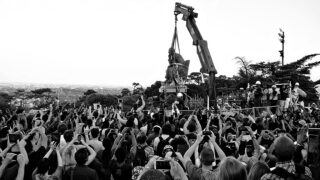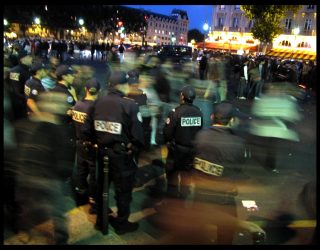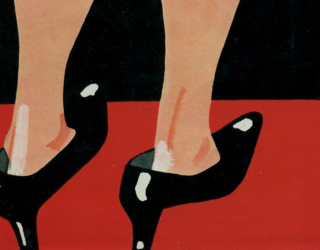Police, surrounding an injured and bleeding youth, faced a group of students who sat before them singing ‘Thina Sizwe’: “We the nation, the brown nation, we cry for our land that was taken by the white people. May they leave our land alone. Children of Africa. They cry for Africa” (translated from Zulu). But the peaceful singing was short-lived, jarring against the chaotic accumulation of student anger and violent repression by security that characterized the recent protests against coloniality at the South African University of Cape Town (the UCT) this month.
Students took what they understood to be colonial artwork from the university and destroyed it. They burnt a bus, a car and the office of the UCT’s Vice Chancellor, Max Price, who said: “It is utterly regrettable that a movement that began with such promise and purport to be fighting for social justice matters has now deteriorated into a group that engages in criminality.” South Africa’s parliamentary Committee Chairperson, Yvonne Phosa also condemned the destruction, stating: “violence and damage to property have no place at our campuses. This translates to lawlessness.”
The press paid particular attention to the destruction of paintings by anti-apartheid artist, Keresemose Richard Baholo. In response protest organizers, Rhodes Must Fall (RMF) provided The Leveller with the following statement:
“We are dismayed when the unfortunate destruction of the work of Tata Keresemose is instrumentalized by white critics who never knew or cared about him or any other Black artist before, precisely to legitimize their reactionary framing of Black protest as barbaric, senseless and violent. Despite the fact that he may not agree with the present modes of protest, we welcome Tata Keresemose’s continued support for the student movements for decolonization in the Mail and Guardian.”
Throughout the protests police threw stun grenades and used rubber bullets, tear gas and pepper spray
A bust of the first woman to attend the UCT, Maria Fuller, was also destroyed during the protest, as criticized by the Economist. However, one RMF activist, Simon Rakei, told the Leveller that they destroyed this artifact because Fuller was complicit in the removals of black people from their land, and was therefore “just as much of a symbol of colonial repression and violence as Rhodes and Jan Smuts.” Art depicting these two colonizers, infamous for their brutal tactics, was also burned. Rakei added that RMF are committed to “black radical feminism” and said: “The feminist struggle as we understand it can only be legitimate and representative of the aspects of all women if it seeks to end all forms of oppression including institutional racism.”
Sympathizers of the protesters expressed dismay at the students’ destructive protest methods. South African writer and UCT alumnus Sisonke Msimang called for the protest organizers, Rhodes Must Fall (RMF), to use peaceful forms of activism. Meanwhile, South African journalist Niall Reddy condemned the destruction yet pointed out that such non-hierarchical protests are prone to spontaneous violence that is not equivalent to “the official brutality of the state”.
RMF activist Rakei told the Leveller:
“the violence of the systematic exclusion of black students from dignified accommodation and access to education and the general absence of dignity which characterizes Black life in this country, is drowned out by an uncritical public outrage at the ‘violent’ destruction of property.”
Throughout the protests police threw stun grenades and used rubber bullets, tear gas and pepper spray. They chased and beat protesters, injuring many. The university’s private security pursued protesters aggressively, causing some to go the police with charges of assault with intent to do grievous bodily harm, unlawful eviction, intimidation, and malicious damage to property. Eight students were arrested.
The press and university management have claimed the students are protesting over ‘trifles’
Besides the university’s repression of the protests, students also take issue with high tuition fees and the shortage of accommodation provided, especially to black students. Last year’s protesters swayed the South African government to promise a 0% tuition fee rise. But they still face accommodation shortages, acknowledged by the UCT’s senior management as a pressing issue, but described by the Economist as a “gripe”.
The Economist, echoing the Chair of the UCT’s Special Executive Task Team, stated that the housing shortage is partly thanks to the protests, because of which students deferred and enrollment increased. This implied that more students needed accommodation. In response to this press coverage, RMF activist, Rakei pointed out that students who participated in previous protests and deferred were not in fact given accommodation except during one month of the exam period, and many were evicted before exams ended. These deferring students therefore did little to exacerbate the accommodation shortage.
The press and the university management, via other statements, have claimed that the students are protesting over trifles. They condemned the students’ violence, calling them misinformed for destroying the work of anti-apartheid artist, Keresemose. The Economist said: “Some of the art-burners might usefully have spent more time in the library studying South African history.”
As a representative voice of RMF, Rakei retorted: “the Economist, when reporting on Rhodes Must Fall, has never fully attempted to understand what decolonization is and why we exist as a movement.” He continued: “it is this very narrow understanding of why the movement exists which makes people eager to frame protesters as barbaric, senseless, directionless arsonists.” Rakei rebuked other negative commentaries, saying: “until there are reparations for slavery and colonialism, as a bare minimum, people should take several seats before they can pass judgement on how we should conduct our struggle… Your position of privilege grants you considerable security, giving you the comfort and ability to think that change can happen in peaceful exchange.”
Image: Desmond Bowles



